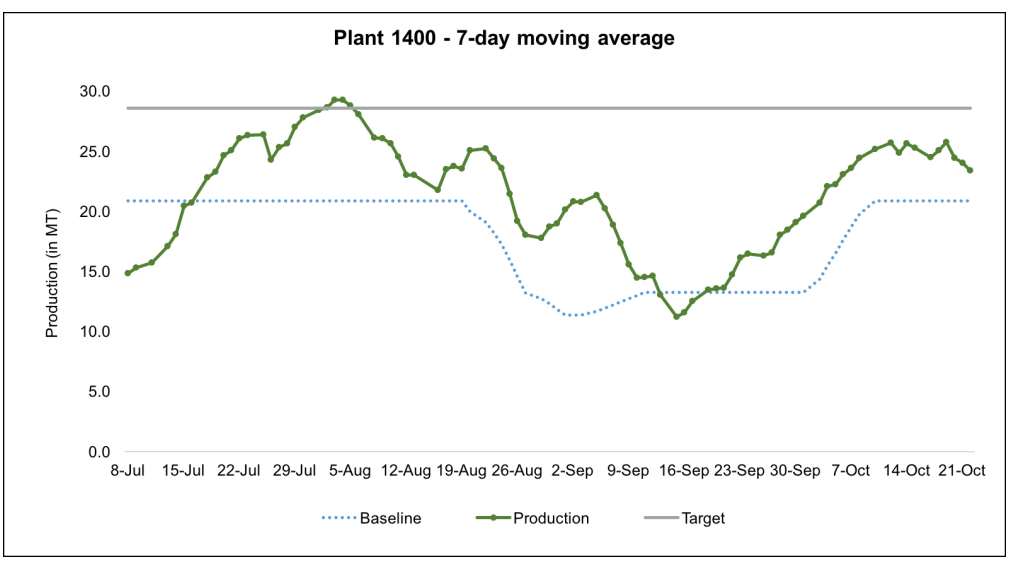At a Glance
- One of the world’s largest producers of whole, powdered and processed spices engaged Renoir Consulting to help improve throughput and reduce recurring problems.
- A number of initiatives were implemented including the installation of an order fulfilment system, shop floor data collection and real-time monitoring systems.
- At the end of the project, the company had increased its shipping capacity by 21% and improved throughput by 12%.
Background
There is a growing demand for spices, herbs and other types of seasonings driven primarily by consumer demand for authentic ingredients and the increasing popularity of ethnic flavours.
According to the report ‘Spices and Seasonings Market, 2021 – 2028’, the global spices market size was US$17.12 billion in 2020 and is expected to grow to US$24.23 billion by 2028 at a compound annual growth rate (CAGR) of 2.55% over the forecast period.
The global network of spice producers is not only a culinary necessity, but also the backbone of the food manufacturing industry, enriching our palates and plates, and supporting livelihoods around the world.
Our client is one of the world’s largest producers of whole, powdered and processed spices manufactured in accordance with global food safety standards to ensure quality and taste.
The Challenge
The company engaged Renoir Consulting to help improve throughput, reduce repetitive failures, and design and install operational scorecards. Key deliverables from the project include:
- Increased plant throughput by eliminating key bottlenecks.
- Implement an order fulfilment system and eliminate fulfilment errors.
- Streamline order processing and shipping.
- Promote a culture of continuous improvement in the operations.
- Design and implement systems to collect shop floor data and provide continuous real-time monitoring.
Analysis
The project started with Renoir’s Focus Process, where we identified several key issues that were limiting the company’s ability to meet its installed capacity. Our analysis revealed that there was inadequate monitoring of output at hourly and shift levels, poor control of planned and unplanned downtime, poor data logging, and a lack of a target-setting process.
People-related challenges were also identified, such as plant operators being unaware of the company’s expectations, inappropriate manpower utilisation, and poor attendance during night shifts.
Focused discussions and observational studies were then conducted with key process owners to gain insight into day-to-day issues, managerial control, and problem-solving processes from operator to production in-charge levels.
It was suggested that the introduction of checks and controls, including system elements, could guide people’s behaviour to achieve the desired level of output. Additional opportunities were identified in areas such as order planning and scheduling, dispatch planning, order pipeline management, order profitability, review mechanisms, and meeting effectiveness.

How to run effective meetings to drive operational excellence

DILO: Driving behavioural change and improving productivity


Why warehouse management matters more than ever
Ready for a change in your organisation?
Project Approach
1. The following measures have been implemented to improve throughput:
- Reduced unplanned downtime through a root cause analysis (RCA) culture.
- Implemented a project management calendar.
- Implemented real-time monitoring of downtime at 15-minute intervals.
- Conducted trials to identify the best possible solutions to recurring problems.
2. The following measures have been implemented to increase the operating time:
- Reduced changeover cleaning time (CoC) by developing and following resource-based Standard Operating Procedures (SOPs).
- Improved order visibility to facilitate resource loading.
- Improved labour availability for night shifts to increase resource utilisation.
A cross-functional Management Action Team (MAT) with participants from all key functions was established to manage these initiatives and ensure the involvement of all key process owners.
Implementation
Strategic Integration Meeting (SIM)
A SIM meeting was held in week seven of the project, and the team developed a time-bound implementation roadmap for improvement. The roadmap was designed to address outstanding issues and create a culture of continuous improvement.
Key initiatives
System elements were implemented to address order planning and scheduling. The team also institutionalised a formal structure to review performance and plan for the next period.
A digital transformation programme was initiated to improve the availability of real-time production data and expedite decision-making. Data collection via handheld devices was designed to enable data transfer to the Enterprise Resource Planning (ERP) system.
To address behavioural and cultural change in the workplace, key process owners were trained in various concepts that could help improve their skills and attitudes.
Results
“Renoir’s capability in engaging with the process owners and shop floor employees to provide quick and lasting solutions impressed us the most.”
Director
Shipping increased by
21%
Throughput improved by
12%
Inventory reduced by
15%
Conversion costs reduced by
8.3%
Do you want to optimise your organisation’s ability to achieve your desired business goals?











